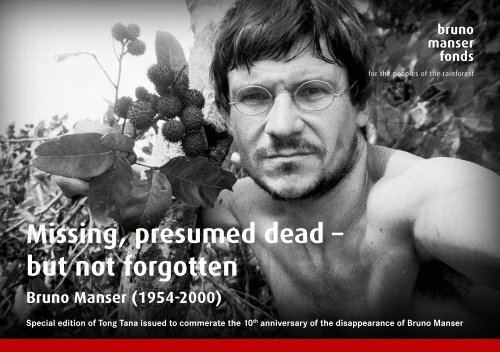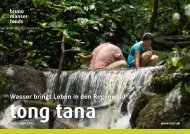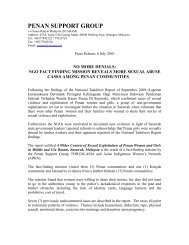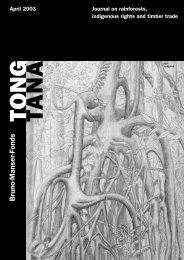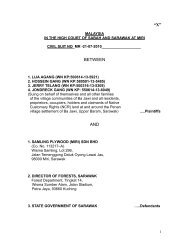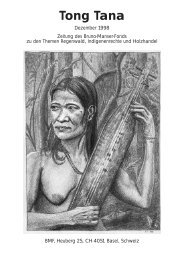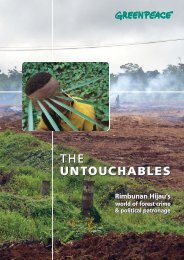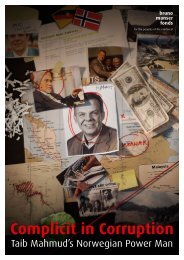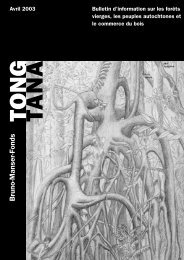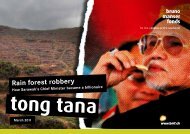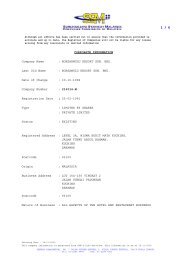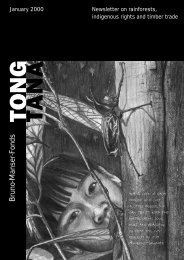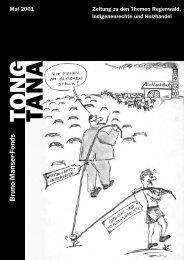BMF_TT__July2010_en.pdf - Bruno Manser Fonds
BMF_TT__July2010_en.pdf - Bruno Manser Fonds
BMF_TT__July2010_en.pdf - Bruno Manser Fonds
Create successful ePaper yourself
Turn your PDF publications into a flip-book with our unique Google optimized e-Paper software.
uno<br />
manser<br />
fonds<br />
for the peoples of the rainforest<br />
Missing, presumed dead –<br />
but not forgott<strong>en</strong><br />
<strong>Bruno</strong> <strong>Manser</strong> (1954-2000)<br />
Special edition of Tong Tana issued to commerate the 10 th anniversary of the disappearance of <strong>Bruno</strong> <strong>Manser</strong>
Memorial Service celebrated on 8 May 2010<br />
in the Elisabeth<strong>en</strong> church in Basel<br />
Almost five hundred people took part in the memorial service<br />
commemorating the 10th anniversary of the disappearance of<br />
<strong>Bruno</strong> <strong>Manser</strong> in the rain forest of Sarawak. With Kaspar Müller<br />
as the repres<strong>en</strong>tative for <strong>Bruno</strong> <strong>Manser</strong>’s heirs acting as moderator,<br />
the following leaders from Switzerland and abroad addressed<br />
the gathering:<br />
Guy Morin (Presid<strong>en</strong>t of the Governm<strong>en</strong>t of the Canton of Basel<br />
Stadt), Monika Niederberger-<strong>Manser</strong> (sister of <strong>Bruno</strong> <strong>Manser</strong>),<br />
Baru Bian (Malaysian land rights lawyer and politician), Saskia<br />
Ozinga (campaign coordinator of FERN, the European Union’s<br />
forest protection network), Mutang Urud (fri<strong>en</strong>d of <strong>Bruno</strong> <strong>Manser</strong><br />
living in exil in Canada), Balang Nalan (P<strong>en</strong>an repres<strong>en</strong>tative from<br />
Sarawak), Es<strong>en</strong>g Pege (P<strong>en</strong>an repres<strong>en</strong>tative from Sarawak),<br />
Tello Abing (P<strong>en</strong>an ambassador in Europe), Ian Mack<strong>en</strong>zie<br />
(Canadian linguist and anthropologist), Thomas Stocker (professor<br />
at the University of Bern, Co-Chair Working Group I of the<br />
UN’s Intergovernm<strong>en</strong>tal Panel on Climate Change, IPCC), Maya<br />
Graf (National Councillor, Gre<strong>en</strong> Party, Canton of Basel Land).<br />
The service was accompanied by the music of Laura Martinoli<br />
and Erika Brunner (Leyoma) and by Rapper Greis’ first perfomance<br />
of a song about <strong>Bruno</strong> <strong>Manser</strong> set to lyrics by Raphael<br />
Urweider. Raphael Urweider also quoted a passage from a letter<br />
that Martin Vosseler had writt<strong>en</strong> to <strong>Bruno</strong> <strong>Manser</strong> from abroad.<br />
This special edition of Tong Tana is printing the speeches giv<strong>en</strong><br />
at the memorial service in their <strong>en</strong>tirety.
«Politics need people<br />
like <strong>Bruno</strong> <strong>Manser</strong>»<br />
Address by Guy Morin, Presid<strong>en</strong>t of the Governm<strong>en</strong>t of the<br />
Canton of Basel Stadt<br />
For c<strong>en</strong>tures, people of the primeval forest such as the P<strong>en</strong>an<br />
pursued their traditional way of life in the intact rain forest of<br />
Sarawak. <strong>Bruno</strong> <strong>Manser</strong> lived together with the P<strong>en</strong>an for many<br />
years – in search of the untouched – as explorer, poet, and<br />
simply as one of them. It was there that he came into immediate<br />
contact with the destructive pot<strong>en</strong>tial of modern civilisation. The<br />
<strong>en</strong>ormous devestation caused by mankind in a short period of<br />
time is almost unfathomable. Today more than 90 perc<strong>en</strong>t of<br />
Sarawak’s forest has be<strong>en</strong> destroyed, and clean drinking water<br />
has become a rarity. The P<strong>en</strong>an and many other indig<strong>en</strong>ous<br />
peoples have be<strong>en</strong> divested of their <strong>en</strong>vironem<strong>en</strong>t and their<br />
livelihood. The destruction of the tropical forest has accelerated<br />
global warming. <strong>Bruno</strong> became cont<strong>en</strong>der for the rights of the<br />
P<strong>en</strong>an, for a sustainable developm<strong>en</strong>t that would protect the<br />
basis of their exist<strong>en</strong>ce and the basis of exist<strong>en</strong>ce for us all.<br />
T<strong>en</strong> years ago <strong>Bruno</strong> <strong>Manser</strong> disappeared without leaving a trace.<br />
It was a loss for all of us, a loss for you our dear P<strong>en</strong>an fri<strong>en</strong>ds.<br />
And yet, we do not want to give in to sadness but rather to continue<br />
the fight in memory of <strong>Bruno</strong> <strong>Manser</strong> and his achievem<strong>en</strong>ts.<br />
«You already know <strong>en</strong>ough. I do as well. What is lacking is the<br />
courage to want to understand what we know and th<strong>en</strong> to act<br />
accordingly.»<br />
This quotation by Sv<strong>en</strong> Lindquist can be found on the first page<br />
of Ruedi Suter’s book «<strong>Bruno</strong> <strong>Manser</strong>, die Stimme des Waldes»<br />
[<strong>Bruno</strong> <strong>Manser</strong>, the Voice of the Forest]. All of you are familiar<br />
with it.<br />
This statem<strong>en</strong>t is so direct, so blunt and clear that it brings each<br />
of us back to the level of reality. At the first mom<strong>en</strong>t, however, its<br />
effect is paralysing. Look at me, I am a politican and, indeed, I<br />
know a lot. Just like all of you. But, where do we start? Where<br />
and wh<strong>en</strong> do we begin to understand? Is it only th<strong>en</strong>, wh<strong>en</strong><br />
necessity and <strong>en</strong>vironm<strong>en</strong>tal destruction become tangible?<br />
At that mom<strong>en</strong>t it will be too late. Where do we get the courage<br />
to implem<strong>en</strong>t the measures that are necessary?<br />
There is so much to be done.<br />
I am oft<strong>en</strong> expected to provide answers, solutions – and immediately,<br />
if at all possible. However, that is difficult. They don’t<br />
always materialise as quickly as we would like. Political processes<br />
are frequ<strong>en</strong>tly t<strong>en</strong>acious and slow because the governm<strong>en</strong>t<br />
must strive for a cons<strong>en</strong>sus, because we must convince a<br />
majority.<br />
<strong>Bruno</strong> <strong>Manser</strong> did not decide for the political approach, probably<br />
for exactly that reason, because it seemed too slow and ponderous.<br />
He w<strong>en</strong>t, and he acted. He made a decision for this way of
life in the forest and for its indig<strong>en</strong>ous inhabitants. I can well<br />
understand. The system in which I find myself sometimes tires<br />
me because the pace at which things move forward is too sluggish<br />
ev<strong>en</strong> for me. Because I realise, for example, that the most<br />
powerful people in this world cannot agree at the World<br />
Climate Summit. They cannot ev<strong>en</strong> come to an agreem<strong>en</strong>t on a<br />
subject that is so crystal clear.<br />
The guidelines for action are giv<strong>en</strong>, and one can simply<br />
conclude that things can’t go on like this. <strong>Bruno</strong> was aware of<br />
it, and thus took the protection of the forests into his own<br />
hands.<br />
The fight against corruption, poverty and for the rights of the<br />
P<strong>en</strong>an had begun, and it continues today. Certain achievem<strong>en</strong>ts<br />
can already be proclaimed:<br />
In 1993, the governm<strong>en</strong>t of the Canton of Basel Stadt forbid<br />
the use of tropical woods in public buildings. The regulation is<br />
still valid and still being implem<strong>en</strong>ted.<br />
Following proposals by Christoph Eymann in 1997 and Remo<br />
Gysin in 2005, a motion was finally submitted by the Committee<br />
for Economic Affairs and Taxes, WAK, in 2007. It called for<br />
a change in ordinance that would allow the introduction of a<br />
universal and mandatory declaration on wood products, but<br />
was th<strong>en</strong> deferred for further discussion. Such is the drawn<br />
out and stony path of politics.<br />
From the annual report of the <strong>Bruno</strong> <strong>Manser</strong> Fund, however,<br />
one can also gather that it has be<strong>en</strong> possible to file two land<br />
rights claims in rec<strong>en</strong>t years. This could only be realised<br />
through the unyielding efforts of the <strong>Bruno</strong> <strong>Manser</strong> Fund, and<br />
included the mapping of the P<strong>en</strong>an’s habitation area. The list<br />
of accomplishm<strong>en</strong>ts is ev<strong>en</strong> longer, and I would like to express<br />
my deep gratitude to all those who have helped for resisting<br />
resignation and for believing in change.<br />
T<strong>en</strong> years have passed since <strong>Bruno</strong> was declared missing.<br />
We are still confronted with the pressing question of what<br />
happ<strong>en</strong>ed.<br />
<strong>Bruno</strong> is very well suited to be rememberd as a myth and<br />
hero. However, a myth cannot act. Therefore let us keep<br />
<strong>Bruno</strong> <strong>Manser</strong> in memory as a visionary and as an acting<br />
person who would have asked for nothing more than for us<br />
to take up his causes and continue to pursue them.<br />
I’m happy to recall how I met <strong>Bruno</strong> <strong>Manser</strong> for the first time<br />
in 1993 on the square in front of the Swiss Parliam<strong>en</strong>t<br />
buildings. Since th<strong>en</strong> I have tried to let his <strong>en</strong>ergy and<br />
willpower flow into my work as oft<strong>en</strong> as I can. People like<br />
<strong>Bruno</strong> <strong>Manser</strong> have always giv<strong>en</strong> me str<strong>en</strong>gth and courage.<br />
Politics need people like <strong>Bruno</strong>.
«I would like to thank<br />
<strong>Bruno</strong> for having op<strong>en</strong>ed<br />
my eyes to the beauty<br />
of nature»<br />
Address by Monika Neiderberger-<strong>Manser</strong>,<br />
sister of <strong>Bruno</strong> <strong>Manser</strong><br />
It is not self-evid<strong>en</strong>t that, after t<strong>en</strong> years without a sign of life, a<br />
person is as close as my brother is today. <strong>Bruno</strong> was always an<br />
unusual person, able to convince others through his charisma<br />
and his love of life. With his long-standing commitm<strong>en</strong>t to protect<br />
the rain forests and their inhabitants, he was repeatedly making<br />
headlines. In his own g<strong>en</strong>uine way, he served as an example and<br />
found many sympathisers and fri<strong>en</strong>ds.<br />
With his profound respect for people and animals, he showed us<br />
that we are only temporary guests on this planet. Ev<strong>en</strong> at an<br />
early age, he was aware of the s<strong>en</strong>sitive relationship betwe<strong>en</strong><br />
nature and the <strong>en</strong>vironm<strong>en</strong>t, and he lived and acted accordingly.<br />
pleasure in simple things was his from the time of birth, and is a<br />
great blessing. This spark kindled me and will hopefully spread to<br />
many other people throughout the world.<br />
This morning, looking for birds on an excursion in Hardwald, I felt<br />
very close to <strong>Bruno</strong>. The variety of birds was fantastic. We could<br />
watch the middle-spotted woodpecker as it was feeding its<br />
young. And the call of the gold<strong>en</strong> oriole announced the pres<strong>en</strong>ce<br />
of a rare guest. These marvelous occur<strong>en</strong>ces make life both<br />
exciting and <strong>en</strong>riching.<br />
However, we would also like to thank those of you who are<br />
remembering <strong>Bruno</strong> in such great numbers today and who have<br />
accompanied and supported our family for so many years. The<br />
many good talks and warm-hearted letters have carried us and<br />
giv<strong>en</strong> us consolation in times that have not always be<strong>en</strong> easy.<br />
The g<strong>en</strong>erous financial contributions to the <strong>Bruno</strong> <strong>Manser</strong> Fund<br />
were – and are – also very important for us so that <strong>Bruno</strong>’s life<br />
work can be continued. Our heartfelt gratitude thus goes out to<br />
all of you.<br />
I would like to thank <strong>Bruno</strong> for having op<strong>en</strong>ed my eyes to the<br />
beauty of nature and to the ess<strong>en</strong>tial in life. The gift of taking
Early morning light in the rain forest of Long Napir on the upper reaches of the Limbang River in Sarawak
Greetings from your world<br />
Auszug aus einem Brief von Martin Vosseler<br />
an <strong>Bruno</strong> <strong>Manser</strong><br />
A hike on Dominica Island to «Boiling Lake», the remote lake that<br />
brings the earth’s heat to a boiling point. In walking through this<br />
mountainous rain forest today, you are ever so close at hand<br />
<strong>Bruno</strong>. Gigantic trees appear again and again. Winding buttress<br />
roots resembling dragon tails oft<strong>en</strong> form pyramids out of which<br />
strong trunks strive upwards and vanish into their disappearing<br />
crowns. Sunrays p<strong>en</strong>etrate the gre<strong>en</strong> canopy of leaves. They<br />
magically fashion a lively play of light and shadow on the damp<br />
floor of the forest. Frisky Anolis lizards scurry over the path. A<br />
reddish-brown crab, with yellow-orange pincers and black-brown<br />
eyes has come to rest in the clear water of a spring. The stillness<br />
is underscored by the gurgling of the stream, the oily-smooth<br />
beauty of the mountain whistler’s call, the purring of the wild<br />
dove, the screeching of the Sissirou parrot, the summing of<br />
insects. But the boa constrictor is not about to reveal itself –<br />
perhaps to prev<strong>en</strong>t you from grabbing its tail?<br />
This is your world. It embodies everything that you taught us and<br />
the example that you set. With your ke<strong>en</strong> observation, astonishm<strong>en</strong>t,<br />
knowledge and drawings, you have op<strong>en</strong>ed our eyes for<br />
the wonders of this earth.
«<strong>Bruno</strong>’s name became<br />
synonymous with courage,<br />
boldness and perseverance<br />
in the fight<br />
against oppression and<br />
injustice»<br />
Ansprache von Baru Bian, Landrechtsanwalt und Politiker<br />
aus Kuching, Sarawak<br />
Thank you for giving me the honour to address this special<br />
gathering, a mom<strong>en</strong>t of commemorating a life and work of a<br />
unique individual and his legacy, of which I am very proud not<br />
only to be associated with but I guess part and parcel of, today.<br />
I speak of non other than our brother and fri<strong>en</strong>d the late <strong>Bruno</strong><br />
<strong>Manser</strong>.<br />
I met <strong>Bruno</strong>, (as he is fondly remembered as), face to face for the<br />
first time in 1990, in Yokohama, Japan. He was together with my<br />
brother Anderson Mutang and some P<strong>en</strong>an fri<strong>en</strong>ds. I remember<br />
they just finished their round the world trip sharing their plight of<br />
the P<strong>en</strong>ans to the world for the first time. I was in Yokohama to<br />
* I<strong>TT</strong>O: International Tropical Timber Organization<br />
oppose the tabling of the I<strong>TT</strong>O* reports on the socio-economic<br />
impact of logging in Sarawak. A delegation of natives came from<br />
Sarawak th<strong>en</strong> to highlight the fact that the finding of the special<br />
committee by I<strong>TT</strong>O did not address the most important and<br />
pertin<strong>en</strong>t issue related to logging th<strong>en</strong> i.e. the indig<strong>en</strong>ous rights<br />
over their lands and forests. I strongly believe th<strong>en</strong> that half of<br />
the main problem related to logging activities, stemmed out from<br />
NCR claims by the indig<strong>en</strong>ous people over lands and the forests.<br />
This was ignored not only by the I<strong>TT</strong>O delegation but also by<br />
those in power and authority in my Country and State of<br />
Sarawak. <strong>Bruno</strong> continued in his pursuit of justice for the<br />
indig<strong>en</strong>ous people of Sarawak in particular the P<strong>en</strong>ans of<br />
Sarawak until his works amongst the P<strong>en</strong>ans bore fruits with<br />
many P<strong>en</strong>ans became aware of their rights, daring to stand for<br />
their rights vis-à-vis their land, the forests and their very life,<br />
which dep<strong>en</strong>ds upon these. The name «<strong>Bruno</strong>» echoes trouble<br />
and problem to the State Governm<strong>en</strong>t of Sarawak and her<br />
servants and ag<strong>en</strong>ts, but it was a beautiful and sweet name in<br />
the ears of those who knew him as the person who came to live<br />
among them and had helped them find ways to tackle their<br />
problems. <strong>Bruno</strong>’s name became synonymous with courage,<br />
boldness and perseverance in the fight against oppression and<br />
injustice of the marginalized in Sarawak. This is because <strong>Bruno</strong><br />
although a foreigner to the people, he chose to understand them,<br />
their life, culture and problems and ev<strong>en</strong>tually gave his life for his<br />
fri<strong>en</strong>ds in Sarawak. What a fri<strong>en</strong>d what a sacrifice!<br />
I came back from that I<strong>TT</strong>O meeting in Yokohama to Sarawak,
Federal Councillor Ruth Dreifuss with <strong>Bruno</strong> during his<br />
hunger strike on the Bär<strong>en</strong>platz in Bern, spring 1993
more convicted and determined to <strong>en</strong>sure that the issue of<br />
native customary rights (NCR) is raised, highlighted and recognized<br />
for the <strong>en</strong>tire world to see. It bore fruit t<strong>en</strong> years later with<br />
the landmark case of Nor anak Nyawai v Borneo Pulp Plantation<br />
& Ors [2001] which for the first time where the High Court in<br />
Malaysia recognized NCR over, farmed land (temuda), territorial<br />
domain (pemakai m<strong>en</strong>ua) and preserved forests (pulau).<br />
Notwithstanding this victory and few more legal victories in the<br />
High Court over the recognition of the NCR of the indig<strong>en</strong>ous<br />
people of Sarawak, the battle still rages on because the people<br />
in power and authority are ignoring these decisions although<br />
these decisions had be<strong>en</strong> <strong>en</strong>dorsed and confirmed by the<br />
highest court in the Country, the Federal Court. Today, there are<br />
about 200 cases p<strong>en</strong>ding in the High Courts of Sarawak, where<br />
my firm handles more than 100 of these cases. I wish to thank<br />
<strong>BMF</strong> for your contributions towards this struggle for justice not<br />
only for the P<strong>en</strong>ans but for the other indeg<strong>en</strong>ous peoples of<br />
Sarawak as well. Our partnership I believe is for a good cause<br />
and for humanity.<br />
Ladies and g<strong>en</strong>tlem<strong>en</strong>, after involving myself in this issue for<br />
more than 20 years now, it dawn upon me that this problem is<br />
somehow directly linked and intertwined with the policies of the<br />
pres<strong>en</strong>t State Governm<strong>en</strong>t whose leaders are only b<strong>en</strong>t towards<br />
self-<strong>en</strong>richm<strong>en</strong>t focused on business, profits, dollars and c<strong>en</strong>ts<br />
and driv<strong>en</strong> by greed of the human hearts. Today I am convinced<br />
that the only mean of resolving this issue effectively and summarily<br />
is to go for a political change in the State Governm<strong>en</strong>t in
Sarawak. This is because our legal victories in Courts so far ring<br />
hollow to our ears with the State Governm<strong>en</strong>t ridiculing these<br />
judgm<strong>en</strong>ts as legally incorrect and thereby appealing resulting in<br />
prolonging justice for the natives.<br />
Coincid<strong>en</strong>tly, I am one of the Oppositions Political Leaders in<br />
Sarawak today having be<strong>en</strong> appointed the State Chairman of the<br />
Peoples’ Justice Party or Parti Keadilan Rakyat (PKR) in October<br />
2009. A writt<strong>en</strong> policy of the National Oppositions Front had<br />
be<strong>en</strong> signed in Kuala Lumpur on the 19th day of December 2009<br />
amongst which we declared that NCR of the indig<strong>en</strong>ous peoples<br />
of Sarawak shall be respected, recognized and protected from<br />
any abuse and manipulations.<br />
Land issue is not only affecting the natives but all races in<br />
Sarawak, perhaps se<strong>en</strong> from differ<strong>en</strong>t angles. Not only natives<br />
want land, all human being need lands to live on and survive.<br />
Land policies must focus on peoples’ needs but at the same time<br />
it must be balanced with the necessity of national developm<strong>en</strong>ts<br />
to achieve national good.<br />
For NCR related claims, we propose a Land Commission to look<br />
into such claims. The Commission must have power to investigate<br />
survey and issue titles indep<strong>en</strong>d<strong>en</strong>tly. Upon proof of NCR, it<br />
is our policy and my undertaking that the said NCR Lands must<br />
be issued titles if claimed by individual and a communal title<br />
gazette for that community. Pulau land or forests area rich with<br />
timber and jungle produce must be gazetted for the use of the<br />
local community and their g<strong>en</strong>erations to come in lined with our<br />
customs which we have practiced since time immemorial for the<br />
purpose of managing our forests and to sustain our livelihood.<br />
In realigning our focus towards solving this land rights issue, I<br />
have a dream for the indig<strong>en</strong>ous peoples of Sarawak and that is;<br />
where our rivers and streams will once again be crystal clear<br />
with the abundance of marine life, the ‘temudas’ or farmed land<br />
protected from trespassers and issued titles thereby empowering<br />
our people to be indep<strong>en</strong>d<strong>en</strong>t and self-suffici<strong>en</strong>t, and the<br />
‘pemakai m<strong>en</strong>ua’, ‘pulaus’ or the communal lands, reserved<br />
hunting grounds be left untouched by any kinds of intrusions by<br />
outsiders resulting in once again a protected healthy <strong>en</strong>vironm<strong>en</strong>t<br />
for game and our customs to flourish. I dream to hear once<br />
again the dear barking away at the edge of the farmland and the<br />
kelabet’s calls (gibbon monkey) for its partners in the nearby<br />
forests. I dream of our young people learning the customary<br />
ways of surviving in the forests and thereby appreciating their<br />
history, culture and customs. I dream of going back to the<br />
basics, our roots our beginning our id<strong>en</strong>tity in the midst of<br />
society’s pursuit for the so-called ‘developm<strong>en</strong>t’ yet ignorant of<br />
what nature can offer each one of us.<br />
In short I dream for a new Sarawak, they called the «Land of the<br />
Hornbills» where once again, we can find the hornbills the<br />
‘k<strong>en</strong>yalang’ be able to proudly fly undeterred through the forests<br />
and the skies of Sarawak.<br />
In conclusion, I wish to record my thanks and appreciation to all<br />
of you at <strong>BMF</strong> and fri<strong>en</strong>ds associated with the works of <strong>BMF</strong>, who<br />
are prepared and willing to journey with me and all of us from<br />
Sarawak to make this dream come true.
Preparations for parachuting with the lamb<br />
«Gumperli» over UN headquarters in G<strong>en</strong>eva,<br />
spring 1998
«<strong>Bruno</strong> still inspires people<br />
to fight for change»<br />
Saskia Ozinga, Kampagn<strong>en</strong>koordinatorin, FERN<br />
(Forests and the European Union Resource Network)<br />
One year after <strong>Bruno</strong> disappeared into Sarawak’s forests the<br />
<strong>Bruno</strong> <strong>Manser</strong> Fund asked me to write something for a book they<br />
wanted to produce. I wrote a rather personal letter to <strong>Bruno</strong>.<br />
This time wh<strong>en</strong> Lukas Strauman asked me if I wanted to speak at<br />
this commemoration, I was reluctant. I thought there would be<br />
people better placed to speak than me. But Lukas told me that I<br />
was one of very few persons he could think of who had worked<br />
with <strong>Bruno</strong> and who were still involved in Malaysian issues. This<br />
shocked me and made me wonder, what has happ<strong>en</strong>ed with all<br />
those people from Europe and elsewhere, who were all rallying<br />
for the people of Sarawak in the 1980s and 1990s?<br />
I think this is an important question as we all know that the<br />
situation in Sarawak is not much better than it was tw<strong>en</strong>ty years<br />
ago. Most forests have be<strong>en</strong> lost the last tw<strong>en</strong>ty years and<br />
Native Customary Rights have still not be<strong>en</strong> recognised. Campaigning<br />
is more needed than ever.<br />
So why is the <strong>Bruno</strong> <strong>Manser</strong> Fund almost the only organisation<br />
who stuck to this work? The answer clearly is because of <strong>Bruno</strong>.<br />
<strong>Bruno</strong> always was incredibly clear that it was his mission, his role<br />
and his duty to fight for the rights of the P<strong>en</strong>an. So the mission<br />
of the <strong>BMF</strong> is clear and they have stuck to it, most notably under<br />
the leadership of Lukas Straumann.<br />
So why th<strong>en</strong> did so many NGOs drop the case? I think there are<br />
three reasons:<br />
1. The Malaysian governm<strong>en</strong>t was making it difficult for people to<br />
leave Malaysia and they themselves countered European NGOs<br />
in every fora to explain to the audi<strong>en</strong>ce that they needed<br />
‘developm<strong>en</strong>t’. It was not up to European NGOs to undermine<br />
Malaysia’s claim for developm<strong>en</strong>t. With no civil society organisations<br />
able to counter this, European NGOs were quickly outmaneuvered.<br />
2. Another reason was the lack of co-ordination and co-operation<br />
betwe<strong>en</strong> and infighting among Malaysian NGOs. Differ<strong>en</strong>t<br />
Malaysian NGOs had (and have) differ<strong>en</strong>t positions but more<br />
importantly seemed to find it difficult to work together in a<br />
harmonious way, which would allow strong support from outside.<br />
As European NGOs we oft<strong>en</strong> heard that because we work with<br />
one NGO, another one would not trust you anymore. This is not<br />
conducive to creating change.<br />
3. The European campaign was focused on timber rather than on<br />
people. The campaign focused on reducing timber imports from
Malaysia and Sarawak specifically. Although the European<br />
campaigns were effective in reducing tropical timber imports in<br />
g<strong>en</strong>eral in the 1980s and beginning of 1990s, this had no<br />
positive impact in Malaysia. Malaysia just exported more to<br />
Japan and China. Rather than on timber we should have focused<br />
more on <strong>en</strong>suring Malaysia upheld its own laws, including laws<br />
recognizing NCR of all native people and ratified UN Human<br />
Rights Conv<strong>en</strong>tions and implem<strong>en</strong>ted them.<br />
This does not explain everything, but in my view these reasons<br />
played an important role in why the P<strong>en</strong>an struggle and the<br />
European campaign to support them have failed.<br />
<strong>Bruno</strong> would be very hurt to see what has happ<strong>en</strong>ed in Malaysia<br />
has not yet be<strong>en</strong> working for the P<strong>en</strong>an. He would be as hurt to<br />
see that in Europe the campaign has almost died. But the rec<strong>en</strong>t<br />
legal victories, the promise of a changing political situation are<br />
hopeful. And we must continue that battle.<br />
I have strong memories of <strong>Bruno</strong>. I described some of them in<br />
the book <strong>BMF</strong> published one year after his disappearance. They<br />
show <strong>Bruno</strong> was authoritative in a fri<strong>en</strong>dly way, convincing,<br />
dedicated but also stubborn. Many of his strategies did not go<br />
down well in Malaysia or with some European NGOs, but his<br />
motivation, his dedication and his fri<strong>en</strong>dliness very much<br />
comp<strong>en</strong>sated for this.<br />
I also described what a special person <strong>Bruno</strong> was and how I<br />
wished he would have be<strong>en</strong> able to share that as much with us,<br />
as his total dedication to the P<strong>en</strong>an people. I described that his<br />
personality and the things he shared with me, I will continue to<br />
treasure. They will stay part of all what keeps me going, and that<br />
in my view he would always stay a part of the movem<strong>en</strong>t, as long<br />
as the movem<strong>en</strong>t keeps going.<br />
I still believe that and I will give you one example: a few years<br />
ago I was in Washington meeting an NGO activist. In his room<br />
was a picture of <strong>Bruno</strong>, the picture of <strong>Bruno</strong> in a boat holding up<br />
his thumb. I therefore thought he was a fri<strong>en</strong>d of <strong>Bruno</strong>, but it<br />
turned out he had never met him but his life and work had<br />
inspired him to do what he did now. So, yes, <strong>Bruno</strong> still is in spirit<br />
a part of the movem<strong>en</strong>t and still inspires people to fight for<br />
change.<br />
We therefore owe it to <strong>Bruno</strong> but ev<strong>en</strong> more, much more, to the<br />
P<strong>en</strong>an and all the other native peoples in Sarawak, to support<br />
them, to show them they are not alone, to keep highlighting<br />
everywhere the lack of respect for the law in Sarawak and to<br />
show how Malaysia fails to comply with international Conv<strong>en</strong>tions.<br />
Malaysian NGOs and peoples organisations must take the<br />
lead in guiding European NGOs, in a united way, on how best to<br />
support them in their fight for change. We can th<strong>en</strong> work<br />
actively, strategically and most importantly, together, towards the<br />
required change.
«All of us P<strong>en</strong>an in<br />
Sarawak are resolved<br />
to continue our struggle<br />
for as long as we have<br />
life within us»<br />
In memory of <strong>Bruno</strong> <strong>Manser</strong> and Kelesau Na‘an*<br />
Headman Along Sega<br />
on behalf of all P<strong>en</strong>an und Kelabit from Upper Limbang Sarawak<br />
Headman Unga Par<strong>en</strong><br />
on behalf of all P<strong>en</strong>an from Lower Tutoh Sarawak<br />
Headman Pada Jutang<br />
on behalf of all P<strong>en</strong>an from Middle Baram Sarawak<br />
Headman Tirong Lawing<br />
on behalf of all P<strong>en</strong>an from Upper Baram Sarawak<br />
* Headman Kelesau Na’an from Long Kerong disappeard mysteriously at the <strong>en</strong>d of 2007 and was later found dead.<br />
The P<strong>en</strong>an suspect that he was murdered because of his resistance to the loggers.
1.<br />
Padé éh k<strong>en</strong>ajung pah tipo Lakei P<strong>en</strong>an (BM)<br />
ngan Tam<strong>en</strong> mé TK Kelesau Na‘an<br />
Kawah pu‘un pemung ngan amé<br />
Lem jah bi<strong>en</strong> éh ti<strong>en</strong>g awah,<br />
barei kawah pu‘un ngan mé‘ Pelinguh.<br />
Amé pu‘un kegusi ngan p<strong>en</strong>gida<br />
tong kekat uban apai ojo koh.<br />
Amé pu‘un peséng néu kemurung<br />
Siget kolé koh tepih. Amé kelo sahé<br />
koh inah petem ngan amé hun iteu. Ngan<br />
mihau tana‘ p<strong>en</strong>gurip mé pah pelinguh.<br />
Bang lep mé pu‘un tai mutau.,<br />
Tong retek tana‘ éh t<strong>en</strong>awai mé‘.<br />
ngelan sahé‘ koh pu‘un megem<br />
tana‘ iteu pah pelinguh.<br />
K<strong>en</strong>in mé‘ pu‘un nevulai seuh<br />
tong kedilem p<strong>en</strong>ika koh. Amé kelo<br />
koh nes<strong>en</strong> éh pu‘un pina keto amé éh<br />
nawai koh, Kawah éh kelunan par<strong>en</strong> éh<br />
amé bé-bé p‘un murung tong koh pah<br />
pelinguh-linguh. Betui koh jian pah tipo tana‘.<br />
Übersetzung aus dem P<strong>en</strong>an ins Englische<br />
von Ian Mack<strong>en</strong>zie, Vancouver<br />
1.<br />
Our brother the flying lemur*, whom we all praise,<br />
and our father the headman Kelesau Na‘an.<br />
You were able to stay among us only for the briefest time<br />
But still we feel as if both of you have be<strong>en</strong> with us forever.<br />
We tremble with joy at the memory of all those times you held out<br />
your hands for us to hold<br />
We are dazzled with happiness every time that we feel you nearby<br />
We want your souls to stand beside us during these times,<br />
and protect our lives and our lands for all eternity.<br />
But our knees grow weak in this land that we love so much<br />
We hope that your souls can hold this land forever in your strong<br />
grip<br />
Our hearts are deeply moved at the knowledge of how much you<br />
care about us.<br />
We want you to realize that so many of us still love you and miss<br />
you.<br />
You two are worthy of our greatest esteem, and all of us will have<br />
fond thoughts of you for all time to come. We will continue your<br />
struggle forever.<br />
* Flying Lemur (Lakei Kubung) is a P<strong>en</strong>an name for <strong>Bruno</strong> <strong>Manser</strong>.
2.<br />
Iwat ha‘ koh n<strong>en</strong>éng mé‘lem kepu pay<strong>en</strong>,<br />
Ngan éh m<strong>en</strong>a‘ ibot urip ngan tipo tana‘<br />
Amé éh si‘ik ngan mutau,<br />
Amé kelo p<strong>en</strong>egahang ngan p<strong>en</strong>gejam.<br />
Jian amé lakau lém p<strong>en</strong>gejian layan<br />
lem tna‘ p<strong>en</strong>gurip retek éh t<strong>en</strong>awai<br />
kesio koh, Ngan maneu keling<strong>en</strong> mé‘<br />
peséng omok m<strong>en</strong>éng Ha‘ jui kok éh<br />
pu‘un lem nyupin mé.<br />
Maneu mé‘ jam seruh doko amé omok<br />
nes<strong>en</strong> kekat éh tebara koh ngan kekat<br />
kelunan mé‘. Jian kekat kelunan pekalai<br />
tong P<strong>en</strong>abara éh nepei ko‘ tong<br />
kekat-kekat ujung kayeu ngan Bateu<br />
tong Tokong Bateu Lawi. Amé pitah<br />
p<strong>en</strong>gerek<strong>en</strong>, bé‘ éh doko mé‘ gahang<br />
nyeruta ngan padé mé‘. Bang doko ke‘ mé‘<br />
peseruta ngan ayau mé‘ jin kegahang usah<br />
mé t<strong>en</strong>gé. Maneu mé‘ ngelayau sedia‘ juk<br />
peseruta, tulat anak ngan ayam mé‘<br />
vam, doko murip ngida, Ngan megem<br />
tana‘ P<strong>en</strong>gida iteu tulat mé<br />
Eh s<strong>en</strong>akat mé lem ngaran koh.<br />
Jin Kekat P<strong>en</strong>an éh pekua k<strong>en</strong>in Lem Sarawak.<br />
2.<br />
We hear the echo of your voices in the blowing wind.<br />
And these voices of yours give life and breath to all the land.<br />
We who are small and tired need your str<strong>en</strong>gth and wisdom.<br />
Let us walk in the beauty of our homeland, in the forest where<br />
our fondest thoughts reside, in the days wh<strong>en</strong> you stood firmly by our<br />
side.<br />
Take us by the hand and guide us in the direction of all those<br />
things that you respect and cherish.<br />
Make our hearing ke<strong>en</strong> <strong>en</strong>ough to hear you wh<strong>en</strong> you call us in<br />
our dreams.<br />
Give us the wisdom to remember all you have taught our people.<br />
Let all of us study the words of guidance and advice that you<br />
have placed on every leaf of every tree, that you have placed in<br />
the stones of Mount Batu Lawi. We are seeking str<strong>en</strong>gth, not to<br />
oppose our fri<strong>en</strong>ds, but to fight our <strong>en</strong>emies; we must do so with<br />
the str<strong>en</strong>gth of our own bodies.<br />
Give us the str<strong>en</strong>gth to struggle always, so that our childr<strong>en</strong> and<br />
grandchildr<strong>en</strong> will live in happyness and joy.<br />
Hold this beautiful land of ours in your strong hands.<br />
In our struggle your two names are in our hearts.<br />
All of us P<strong>en</strong>an in Sarawak are resolved to continue our struggle<br />
for as long as we have life within us.
Op<strong>en</strong>air shower at Heuberg 25, the former headquarters<br />
of the <strong>Bruno</strong> <strong>Manser</strong> Fund in the c<strong>en</strong>tre of Basel’s old city.
«<strong>Bruno</strong> <strong>Manser</strong> exemplified<br />
respect, understanding<br />
– and the action that<br />
can evolve from it»<br />
Address by Professor Thomas Stocker, Physics Institute,<br />
University of Bern,<br />
Co-Chair Working Group I of the Intergovernm<strong>en</strong>tal Panel<br />
on Climate Change<br />
It was a memorable experi<strong>en</strong>ce. I was working as a young<br />
sci<strong>en</strong>tist at Columbia University in New York in 1992, and was<br />
focusing on global warming and the role of the ocean in rapid<br />
climatic shifts. It was the time wh<strong>en</strong> Al Gore was publishing his<br />
first book «Earth in the Balance», of the leg<strong>en</strong>dary Rio Confer<strong>en</strong>ce<br />
that elaborated the Framework Conv<strong>en</strong>tion on Climate<br />
Change, and everyone pres<strong>en</strong>t was weaing a battery-less light<br />
gre<strong>en</strong> Swatch on his wrist.<br />
Wh<strong>en</strong> I heard that <strong>Bruno</strong> <strong>Manser</strong>, a Swiss living in Sarawak, and<br />
his P<strong>en</strong>an fri<strong>en</strong>ds were organising an ev<strong>en</strong>t in Manhattan’s<br />
Cathedral of St. John the Divine for these <strong>en</strong>dangered people of<br />
the Malaysian rain forest, it was clear for me that I had to go. I<br />
had heard and read a lot about <strong>Bruno</strong> <strong>Manser</strong>, the man who had<br />
learned the language of the P<strong>en</strong>an, who had totally submerged<br />
himself in their culture, and who had transformed himself into<br />
some sort of improbable mess<strong>en</strong>ger by sitting on a tree trunk –<br />
thoughtful, deliberate and constantly filling his notebook with<br />
impressions. Images that are certainly close to all of us.<br />
I can well remember the music and the sound of P<strong>en</strong>an flutes, a<br />
short address by <strong>Bruno</strong> <strong>Manser</strong>, his <strong>en</strong>igmatic gaze was a<br />
mixture of scepticism, reserve and determination. It all had an<br />
<strong>en</strong>ormous radiance for me in this large cathderal. In just a few<br />
words, he gave us a simple message: here are people who have<br />
lived in the forests of Sarawk for c<strong>en</strong>turies, as a natural part of<br />
the rain forest’s ecosystem, in a balance that has be<strong>en</strong> adapted<br />
over g<strong>en</strong>erations. And here are the interests of corporations<br />
which, for the sake of short-sighted profit-thinking – is that<br />
indeed «thinking»? – are destroying this community through<br />
deforestation, land acquisition and «developm<strong>en</strong>t».<br />
<strong>Bruno</strong> <strong>Manser</strong> has shown us that three basic things are required<br />
for individuals to contribute to the solution of a problem: respect,<br />
understanding, and action. He set an example of these principles<br />
in a simple and obvious way.<br />
1. Respect:<br />
Respect is the beginning of the will to understand. Without<br />
respect, we do not examine, we do not scrutinise, but rather
ush over and remain on the surface. <strong>Bruno</strong> <strong>Manser</strong>’s efforts<br />
were marked by a deep respect for the people in the rain forest,<br />
for the complexity of the ecosystem and for their mutual dep<strong>en</strong>d<strong>en</strong>ce.<br />
Whoever has respect maintains an initial distance to the<br />
problem and takes time for analysis and obervation.<br />
2. Understanding<br />
Understanding can take differ<strong>en</strong>t forms. As a natural sci<strong>en</strong>tist,<br />
I myself practice a very specific and formally-structured way of<br />
acquiring understanding. It is rational and impersonal, in other<br />
words it is not fixed on the observer. The claim of sci<strong>en</strong>tific<br />
knowledge is the indep<strong>en</strong>d<strong>en</strong>ce of the person who has obtained<br />
it. <strong>Bruno</strong> <strong>Manser</strong> has shown us that there is also an equally<br />
important level of personal understanding: the directly experi<strong>en</strong>ced,<br />
the locally suffered and the locally <strong>en</strong>joyed. <strong>Bruno</strong><br />
<strong>Manser</strong> acquired this immediate understanding in Sarawak and<br />
shared it with us through his visits and his books.<br />
3. Action<br />
An active response results from the understanding of a problem<br />
and from the possibility of being able to assess future consequ<strong>en</strong>ces.<br />
Today we can compreh<strong>en</strong>d the effects of overloading<br />
an ecosystem, the hastily logged c<strong>en</strong>turies-old rain forests, the<br />
burning of coal and petroleum to g<strong>en</strong>erate <strong>en</strong>ergy. The result is a<br />
weak<strong>en</strong>ing of the ecosystem as a provider of services, loss of<br />
bio-diversity and climate change.<br />
Wh<strong>en</strong> we have reached an understanding for these problems,<br />
th<strong>en</strong> resolute action seems to be the only reasonable response.<br />
<strong>Bruno</strong> <strong>Manser</strong> acted in his own way, with his own means. He<br />
roused people through spectacular demonstrations, through his<br />
own suffering and through public relations. Yet in the <strong>en</strong>d he did<br />
not achieve his goal. Why?<br />
I have placed respect at the beginning of the chain: respect in<br />
the eyes of the P<strong>en</strong>an, respect in the pres<strong>en</strong>ce of the rain forest,<br />
and respect before the earth’s ecosystem in its <strong>en</strong>tirety. First of<br />
all, it is the linking of respect and understanding that moves us<br />
to act. If there is no respect, there is no need to act. Through his<br />
work in Sarawak and his life with the P<strong>en</strong>an, <strong>Bruno</strong> <strong>Manser</strong><br />
exemplified how respect and understanding can lead to action.<br />
But he failed for the lack of respect of those whom he wanted to<br />
convince.<br />
Thus the story and fate of <strong>Bruno</strong> <strong>Manser</strong> also have a direct<br />
importance for confronting the global chall<strong>en</strong>ge of climate<br />
change. For decades, sci<strong>en</strong>ce has be<strong>en</strong> compiling and assessing<br />
data relevant to an understanding of the earth as a system, the<br />
effects of changes in temperature and percipitation, the rise in<br />
the sea level, and the deglacification in Gre<strong>en</strong>land and the<br />
Antarctic. We have be<strong>en</strong> providing this complex information, as<br />
gathered in the UN Climate Change Reports – the 5 th is to be<br />
published in 2013, to political authorities since 1990. These<br />
facts, combined with respect before the earth’s ecosystem that
affords us much needed services – free of charge and on a daily<br />
basis – should convince us to act quickly and resolutely. But it is<br />
only possible to act wh<strong>en</strong> understanding and respect are linked.<br />
One of the facts is that ca 20% of the world’s pres<strong>en</strong>t carbon<br />
dioxide emissions <strong>en</strong>sue from the deforestation of the rain<br />
forests. Reduction of emissions, such as that forse<strong>en</strong> in the<br />
Cop<strong>en</strong>hag<strong>en</strong> Accord of 18 December 2009, could be realised<br />
most quickly with a worldwide ban on deforestation. Important<br />
and unique leb<strong>en</strong>sräume would be preserved, and gain in value<br />
for the future. Brazil recognised this and introduced it into the<br />
Cop<strong>en</strong>hag<strong>en</strong> negotiations. Although CO2 emissions could be<br />
significantly reduced by <strong>en</strong>forcing the ban, the sc<strong>en</strong>ario indicates<br />
that at least 60% would still be lacking by 2050 and could only<br />
be comp<strong>en</strong>sated by the determined efforts of the industrial<br />
nations.<br />
What is valid for the rain forest in Sarawak is also valid on a<br />
global scale. It will only be possible to act wh<strong>en</strong> understanding<br />
and respect are linked . This was the example that <strong>Bruno</strong> <strong>Manser</strong><br />
set for us.
«People like <strong>Bruno</strong><br />
<strong>Manser</strong> have a lasting<br />
influ<strong>en</strong>ce on political<br />
decisions»<br />
Address by Maya Graf,<br />
National Councillor, Gre<strong>en</strong> Party, Canton of Basel Land<br />
With his dedication and commitm<strong>en</strong>t, <strong>Bruno</strong> <strong>Manser</strong> s<strong>en</strong>sitised<br />
many people not only for the efforts of the P<strong>en</strong>an in their fight to<br />
prev<strong>en</strong>t the destruction of their <strong>en</strong>vironm<strong>en</strong>t and basis of their<br />
exist<strong>en</strong>ce. <strong>Bruno</strong> <strong>Manser</strong> should also be thanked for the att<strong>en</strong>tion<br />
and support being giv<strong>en</strong> to protecting the tropical forests by<br />
Swiss politics.<br />
It was thanks to <strong>Bruno</strong> <strong>Manser</strong> that Swiss politics were initially<br />
confronted with the destruction of the tropical forest in the<br />
1980s. I found one of the first attempts to be that of National<br />
Councillor Pini who addressed the following question to the<br />
Federal Council in 1989: «Does the Federal Council know about<br />
<strong>Bruno</strong> <strong>Manser</strong>, the Swiss ethnologist who is fighting against the<br />
destruction of the tropical forests in Sarawak and for the<br />
protection of the indig<strong>en</strong>ous people of Punan? <strong>Bruno</strong> <strong>Manser</strong>,<br />
pursued and oppressed by the legal governm<strong>en</strong>t (with a US$<br />
25,000 price on his head), has appealed to the international<br />
community for help in protecting the earth’s last large oxyg<strong>en</strong><br />
reserves. How does the Federal Council int<strong>en</strong>d to respond to the<br />
rec<strong>en</strong>tly published plea of our fellow citiz<strong>en</strong>?”»<br />
The answer from R<strong>en</strong>é Felber, th<strong>en</strong> Federal Councilor, was<br />
similar to responses to other motions. Although they were always<br />
fri<strong>en</strong>dly and kindly disposed toward <strong>Bruno</strong> <strong>Manser</strong> as a person<br />
and to his efforts, the Federal Council was not prepared for<br />
Switzerland as a «small» country to undertake something concrete.<br />
Wh<strong>en</strong> <strong>Bruno</strong> <strong>Manser</strong> started a hunger strike on the Bär<strong>en</strong>platz in<br />
Bern, protesting against the import of tropical woods, the<br />
subject came up again in Parliam<strong>en</strong>t. Many of you surely recall<br />
how Ruth Dreifuss, the newly elected Federal Councillor,<br />
immediately showed her solidarity. She sat down next to him,<br />
and took up her knitting as he was doing his. One can surely say<br />
that these images are quite unforgetable and are a sign for all of<br />
us to continue.<br />
With this rather spectacular and emotional manifestation, <strong>Bruno</strong><br />
<strong>Manser</strong> roused Parliam<strong>en</strong>t.<br />
During one of the National Council’s interrogation periods,<br />
Hanspeter Thür, former National Councillor from the Gre<strong>en</strong> Party<br />
and pres<strong>en</strong>t Federal Data Protection Commissioner, asked the<br />
following of the Federal Council: «<strong>Bruno</strong> <strong>Manser</strong> and his likeminded<br />
fri<strong>en</strong>ds have be<strong>en</strong> in a hunger strike since March 1 st ,<br />
1993 and will continue until the import of tropical woods from
Sarawak, Malaysia has be<strong>en</strong> stopped. Is the Federal Council<br />
planning to undertake something in this respect, and would it be<br />
willing to receive a delegation from the <strong>Bruno</strong> <strong>Manser</strong> Fund?»<br />
The cont<strong>en</strong>t of Federal Councillor Jean-Pascal Delamuraz’s<br />
response was disappointing. He argued that there was something<br />
more effective to do than to require mandatory declarations.<br />
Switzerland would try to conduct talks with the producing<br />
countries and would work toward a recognition of the problem.<br />
But former National Councillor Hugo Wick and Councillor of<br />
State Rosemarie Simm<strong>en</strong> did not give up. Their motions calling<br />
for a mandatory declaration on tropical woods were actually<br />
submitted to the Federal Council as test proposals but in the <strong>en</strong>d<br />
they dwindled and fell short.<br />
In 1994 and again in 1997, Christoph Eymann, pres<strong>en</strong>t member<br />
of the Governm<strong>en</strong>t of the Canton of Basel Stadt and former<br />
National Councillor, followed with two motions requesting a<br />
mandatory declaration for tropical woods. However, exactly t<strong>en</strong><br />
years had to pass until our Swiss Parliam<strong>en</strong>t, on 26.09.2007,<br />
was finally ready to submit a motion for the declaration of wood<br />
and wood products and to include the issue that I had repeatdly<br />
tried to introduce in Bern: namely to take measures against the<br />
trade with illegally logged timber.<br />
But of much greater importance, it takes people like <strong>Bruno</strong><br />
<strong>Manser</strong> who dedicate themselves to a cause - stubbornly,<br />
imaginatively, and with their <strong>en</strong>tire being. In this way they<br />
influ<strong>en</strong>ce other people and their attitudes, they school our<br />
awar<strong>en</strong>ess and they motivate and prevail upon <strong>en</strong>vironm<strong>en</strong>tal<br />
organisations to continue their efforts for these concerns that<br />
are so important for the future of our planet.<br />
And not least of all, but perhaps somewhat slower: people<br />
like <strong>Bruno</strong> <strong>Manser</strong> have a sustaining influ<strong>en</strong>ce on our politics!<br />
Which is meant in a double s<strong>en</strong>se of the word. Thanks go to<br />
<strong>Bruno</strong> <strong>Manser</strong>.<br />
What do I want to say with this? That in politics, and especially<br />
in Bern, the wheels turn slowly, too slowly? Perhaps that’s true<br />
as well.
<strong>Bruno</strong> <strong>Manser</strong> Rap<br />
Uraufführung Off<strong>en</strong>e Kirche Elisabeth<strong>en</strong>, Basel,<br />
8. Mai 2010<br />
(U) Was isch scho ei <strong>Manser</strong>, gäge Abhouzigspanzer?<br />
e Chance hett er nie gha, gäge dä Wahnsinn,<br />
93 han i ne gseh, mit nünzähni<br />
Ar Front in Bärn sitze, fridlech wi Ghandi.<br />
Är het nie gnärvt, still glismet am Bode<br />
fründlech grüesst u verzeut, i bine go lose<br />
Är sigi da für e Dschungel im Hungerstreik,<br />
Dir müesst haut dra gloube we der Wunder weit!<br />
U dr Rägewaud? Wartet immer no ufne Gägegwaut,<br />
u o wes niemer me interessiert, säg is haut<br />
er het sech nid erhout, im Gägeteil<br />
mir wei immer no me Tropeholz für chli Läb<strong>en</strong>sfröid.<br />
Vilech isch ja sis Verschwinde dr letztsch Hiiwis gsi,<br />
das d Wälder verschwinde, bis mir begriife:<br />
ersch we dr letzscht Dschungel aus verscholle giut,<br />
chöi mer sicher si, das dr <strong>Manser</strong> gstorbe isch.<br />
Sit-in at the headquarters<br />
of the Marub<strong>en</strong>i Corporation<br />
in Tokyo, December 1992<br />
(G) Hüt hani ne gseh, nid lang sit är ewägg<br />
Är isch gloffe vom basler bahnhof uf sarawak<br />
I hanim grüeft «hei bruno i ha di gseh mann»<br />
Är het mer gwunke und isch witter zu de p<strong>en</strong>an
När hani gmeint dasi tröim, usem bett chum’<br />
Won är dürelouft spriesse böim usem beton<br />
När wärde strasse zu acker und zu wäuder<br />
Und mit eire hand, ruumt är aui bagger usem wäg<br />
<strong>Bruno</strong> blybt dür sini tat<strong>en</strong> userwäut<br />
ÄR FÄÄUT NID NUR FÜR ÜS, ÄR FAUT FÜR ÜSI WÄUT<br />
Und wüu ne d’gwüssheit nie verlaht<br />
Dass sech dr kampf lohnt, o we me sis läbe laht<br />
Drum git er aues und no witter es läbelang<br />
Är geit alei und mir stö aui näbedrann<br />
Was chöi die ganze panzer und dä wahnsinn<br />
Gäge d’überzügig vo eim <strong>Bruno</strong> <strong>Manser</strong><br />
Und är blybt dür sini tat<strong>en</strong> userwäut<br />
ÄR FAUT NID NUR FÜR ÜS, ÄR FÄÄUT FÜR ÜSI WÄUT<br />
das är verreckt, hoffe si, mit schlächtem Gwüsse.<br />
Viu hei ne ghasset, wäg sine guete Tate,<br />
überläbe isch schwirig aus Persona non grata,<br />
werum är verschwunde isch, chasch drümau rate<br />
oder im Urwald go P<strong>en</strong>an-Nomade frage…<br />
Text: Greis (G) / Raphael Urweider (U)<br />
(U) Är isch meh aus e Maa gsi, e <strong>Manser</strong>,<br />
Är isch meh aus eifach da gsi, e Wanderer<br />
vo Basel nach Borneo, Malaysia,<br />
hett sech viu vorgnoo gha, ke eifachi Sach.<br />
Hett Gloube gha, ohni fanatisch ds sii<br />
hett missioniert mit viu Phantasie,<br />
steut me sech elei gäge ne ganzi Industrie<br />
macht me sech haut sehr unbeliebt…<br />
Är hätts chönne wüsse, doch es hätt nüt gnützt,<br />
macht, was ne überzügt, trotz Heckeschütze<br />
trotz kriminelle Spekulante,
Closing words and thanks<br />
Kaspar Müller, Repres<strong>en</strong>tative of <strong>Bruno</strong> <strong>Manser</strong>’s heirs<br />
I would like to thank all who have be<strong>en</strong> involved for their active<br />
and committed help, their interesting contributions and their<br />
expressions of sympathy for <strong>Bruno</strong> <strong>Manser</strong> and the P<strong>en</strong>an.<br />
As part of the concept for this memorial service, it was clear for<br />
the family, for the <strong>Bruno</strong> <strong>Manser</strong> Fund and for myself that we<br />
must critically examine our role. Because it is too easy to simply<br />
name those who are «at fault». In a globally connected world, we<br />
– as people living in an industrialised and highly developed part<br />
of this world – are also «co responsible».<br />
Thus it is important not only to call the problem by name and<br />
point a finger at others, but also to establish courses of action<br />
that help us to acknowledge our co-responsibility.<br />
Because it is, and remains, an illusion to believe that a decadeslong,<br />
profit-ori<strong>en</strong>ted devestation can be stopped without cost.<br />
And as members of p<strong>en</strong>sion funds and thus as investors, you can<br />
insist that your assets are not being invested in firms with<br />
destructive activities. What is the point of higher stock prices<br />
wh<strong>en</strong>, in the <strong>en</strong>d, we are confronted with the destruction of the<br />
basis of our exist<strong>en</strong>ce, as we have se<strong>en</strong> with BP in the Gulf of<br />
Mexico.<br />
Like the outflowing oil that devoured the <strong>en</strong>vironm<strong>en</strong>t step by<br />
step, we are destroying the climate, the bio-diversity, and the<br />
culture and life of many indig<strong>en</strong>ous peoples by financing the<br />
deforestation in the rain forests.<br />
Regardless of how courses of action are adopted and implem<strong>en</strong>ted<br />
by individuals, regardless of the ext<strong>en</strong>t to which they id<strong>en</strong>tify<br />
with <strong>Bruno</strong> <strong>Manser</strong> and his concerns, one thing is clear:<br />
We must make a decision for policies that are based on a s<strong>en</strong>se<br />
of responsibility.<br />
For instance, we can achieve a lot in our attitudes as consumers.<br />
We can refuse to use tropical wood and palm oil.<br />
We can support political policies, and politicians, in Switzerland<br />
that credibly fight against the destruction of tropical forests and<br />
who advocate the rights of idig<strong>en</strong>ous people. We can support a<br />
policy in favor of the climate, ev<strong>en</strong> if it implies financial costs.
Guy Morin<br />
Presid<strong>en</strong>t of the Governm<strong>en</strong>t<br />
of the Canton of Basel Stadt<br />
Monika Niederberger-<strong>Manser</strong><br />
sister of <strong>Bruno</strong> <strong>Manser</strong><br />
Baru Bian<br />
land rights lawyer and politician<br />
Saskia Ozinga<br />
FERN<br />
Mutang Urud<br />
repres<strong>en</strong>tative of the Kelabit<br />
Ian Mack<strong>en</strong>zie<br />
linguist and ethnologist<br />
Thomas Stocker<br />
Professor, University of Bern,<br />
IPCC<br />
Maya Graf<br />
National Councillor, Gre<strong>en</strong> Party,<br />
Canton of Basel Land<br />
Greis and Raphael Urweider<br />
rapper<br />
author<br />
Kaspar Müller<br />
repres<strong>en</strong>tative of<br />
<strong>Bruno</strong> <strong>Manser</strong>’s heirs
Impressum<br />
Tong Tana means «in the forest» in the<br />
language of the indig<strong>en</strong>ous P<strong>en</strong>an living<br />
in the rainforest of Sarawak (Malaysia)<br />
Published by the <strong>Bruno</strong> <strong>Manser</strong> <strong>Fonds</strong><br />
Association for the Peoples of the Rainforest<br />
Socinstr. 37, CH-4051 Basel, Switzerland<br />
Telephone +41 61 261 94 74<br />
E-mail: info@bmf.ch<br />
Internet: www.bmf.ch<br />
Editor: Lukas Straumann<br />
Contributor to this issue: Erwin Zbind<strong>en</strong><br />
Photographs: <strong>BMF</strong><br />
Graphic design: moxi ltd., Biel<br />
For donations: Postal account 40-5899-8<br />
or Bank Coop, CH-4002 Basel,<br />
account 421329.29.00.00-5<br />
IBAN: CH8808440421329290000<br />
SWIFT: COOPCHBB


